Bissell Centre is holding its annual Coldest Night of the Year walkathon on Saturday, February 28.
Beginning at YMCA Boyle Street Plaza (9538 103A Ave. Edmonton), the opening reception starts at 4:00 p.m. and walkers will set off at 5:00 p.m.
This event features hundreds of Edmontonians walking through the city’s downtown, in matching colourful toques, to help raise funds for Bissell Centre’s critical programs and services.
Last year’s walk
Last year’s walk saw close to 400 walkers on 79 teams helping to raise $150,000 for programs that help people find sustainable housing, increase their financial knowledge, connect to Indigenous culture, and provide essentials for families.
“There’s something powerful about seeing hundreds of people bundle up and walk together on a cold winter evening,” says Michelle Reid, Manager of Community Engagement. “It’s a visible reminder that our community cares deeply about making sure everyone has access to safe housing and supports.”
What to expect at the event
Teams of walkers have been raising funds since November and will continue until the day of the walk. Kicking off from Boyle Street Plaza, walkers can choose either the two kilometre route through City Centre or five kilometre route up to 109 Street before heading back to Boyle Street Plaza for a reception with warm food and soft drinks.
Reid says seeing people from the larger Edmonton community show up to walk alongside one another reminds her how events like these open doors for people and helps strengthen the community.
About Coldest Night of the Year
Coldest Night of the Year started back in 2011, with three Ontario ministries, to raise awareness around what their communities are experiencing. It wasn’t long before hundreds of organizations across Canada and the United States adopted the event, including Bissell Centre whose own Coldest Night of the Year walkathon remains an essential event to ensure it can continue offering its range of programs including in housing, financial empowerment, family supports, and Indigenous cultural supports.
Around 50 per cent of pregnancies in Canada are unintended. This could mean a person might not be looking for any of the signs and could only find out later in the term that they’re expecting. Without knowing, a person will likely continue with their lifestyle — including medical and recreational substances.
More than a decade ago, the Red Shoe Walk kicked off to start discussions about Fetal Alcohol Spectrum Disorder (FASD) – a condition that affects upwards of four per cent (4%) of Albertans. This is a condition where a fetus is exposed to alcohol and delays development physically and mentally — which can affect a person for the rest of their lives. FASD is widely misunderstood as a condition, but it’s not only the people living with it who face misconceptions — the worst treatment is often reserved for their mothers.

Cryptic pregnancies and missing hormones
The real reasons why someone might drink while pregnant are always much more nuanced. While there is a knee jerk reaction to assume malice or gross irresponsibility, there is a very real likelihood that they never knew they were pregnant at all.
Approximately one in 2,500 women experience what’s called a cryptic pregnancy. This means everything typically associated with the experience of being pregnant (morning sickness, weight gain, pains, etc.) are not present at all for the duration of their pregnancy — often only learning that they’re pregnant once they’ve delivered their new child.
This can happen for a myriad of reasons. One common reason occurs in approximately one in 475 pregnancies where the body doesn’t produce the HCG hormone that tells the body it’s pregnant. And while there are biological reasons why someone may not know they’re pregnant and might ingest alcohol while pregnant, the social conditions can play a much larger role.

Misinformation and social pressure
Misinformation concerning alcohol and pregnancy is rampant. From alcohol helping pregnant people to sleep, to red wine being a healthier choice, it can be easy for people to rationalize drinking alcohol while pregnant — after all, western culture does have a strong emphasis on normalizing alcohol.
When bad information reaches vulnerable populations, it can lead to disastrous decisions. Some individuals experiencing poverty (around 10 per cent of women in Canada live on low incomes) are susceptible to misinformation like anyone else. With added stresses like housing insecurity (which affects 28 per cent of women), bad information can begin to pass through one’s better judgement filters. Issues around online media literacy is rampant across our society today and this is only one more area where inaccurate content can do incredible harm.
Adding to the issue is access to sound medical advice from reputable sources. Many vulnerable people might not have access to a medical professional for advice — whether that’s because of location or even trust in medical establishment. Depending if a person carries trauma around medical institutions (as many vulnerable people do), they could distrust medical experts and instead lean on advice from social platforms.
While organizations like us, as well as drink manufacturers and establishments are all working to better inform people on the harms of drinking alcohol while pregnant, the social pressures to drink alcohol and potentially misinformed outside influence could lead a person to thinking they are making a fully-informed decision.

Supporting those affected by FASD
This is where shaming individuals who drank while pregnant can do even more harm. The frequently cited four per cent of the population is likely an underestimate — because people avoid talking about something that leaves them feeling ashamed. This could even prevent people from seeking out any further supports that could help with their and their child’s quality of life.
What’s most important is ensuring anyone affected by FASD has the supports they need. This is why Bissell has its Fetal Alcohol Spectrum of Services (FASS), working with the Edmonton and Area Fetal Alcohol Network (EFAN) program providing supports for individuals and families alike with referrals for FASD diagnoses and system navigation to help people find the best services and supports for their individual needs. We also run Hope Terrace — a first-of-its-kind permanent supportive housing complex specifically designed for people with FASD. With wraparound supports in place, the folks who call Hope Terrace home can learn to lean on their strengths to give back to their larger communities.
While the Red Shoe Walk started to spark conversations about FASD, it’s worth talking about everyone affected by the condition. This includes those who live with FASD and their mothers who may have an experience worth sharing and learning from. Reducing stigma around all dimensions of FASD will help lead us to a better quality of life for those affected by FASD, and better tools to help prevent any future risks of FASD.

The role family plays in many Indigenous cultures can’t be understated. Blood familial ties and chosen families can hold the most sacredness and honour for Peoples in Indigenous Nations. The Community at Bissell Centre is no different.
Those strong family ties are especially prevalent at our National Indigenous Peoples’ Day (NIPD) event outside our Community Space (10530 96 Street) every June 21. This is a day of celebration where we block off part of the street, invite performers and artists to share their crafts, and serve some of the best Indigenous cuisine you can find in the city.
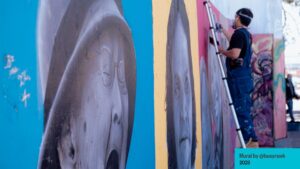
The Reverence held for Elders
Honouring Elders is one of the most important customs of NIPD. The knowledge and teachings these individuals hold in the communities not only preserves the traditional ceremonies and rituals that bring so much vibrancy and life to Indigenous Nations – they can also help guide individuals through challenges and onto the most life-affirming paths.
“One of the most important services we can offer with Bissell’s Indigenous Engagement Program is connecting individuals to Elders,” explains Sarah Higgins, Director of Indigenous Engagement and Integrated Family Services – and a Red River Métis woman. “The teachings and guidance Elders can provide and the connection they foster to Indigenous Nations can help a person decide it’s time to reach out for further supports in their unique journey out of poverty.”
At the NIPD event, you’ll see a tent specifically for Elders to sit in. They’re often accompanied by children from Indigenous Nations, as well, symbolizing how their knowledge will be passed down through generations to ensure the culture and traditions remain a vital part to one’s Indigenous identity.
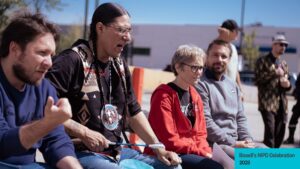
The Crucial Chosen Families Built in the Community
For people accessing the services at Bissell Centre, families by blood aren’t always a part of their lives, yet the importance of family never really goes away for a lot of folks. Creating new chosen families then becomes a part of life in the community.
“It’s not uncommon to see folks in the community calling each other uncle, aunty, or cousin because this is the family they’ve built for themselves,” says Higgins. “Just like a family, these are support systems for each other and we see these connections as real family – just the same as any blood tie.”
Families and communities coming together to celebrate the resiliency of Indigenous Peoples shows how important NIPD is for the folks in downtown Edmonton. And no matter what that family looks like and who makes up that unique family unit, NIPD will have space for all who attend to celebrate the strength, culture, and customs from Indigenous Nations.
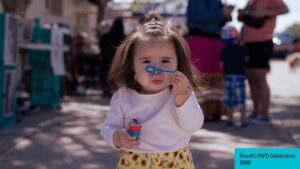
For Sarah Higgins, Director of Indigenous Engagement at Bissell Centre, the word that comes most to mind when she thinks about National Day for Truth and Reconciliation is ceremony. She explains how every Indigenous member of Bissell Centre’s staff and community has a direct correlation to or has been directly impacted by residential schools.
“It’s a way to express our grief and heal from our losses in a healthy and enriching way,” says Higgins. Bissell Centre is holding its own National Day for Truth and Reconciliation ceremony on September 29 from noon to 9:00 p.m. and will feature a pipe ceremony, a Round Dance, and a traditional feast provided by Red Seal Indigenous Chef Matthew Potts.
A History of Indigenous Cultural Ceremonies
While Bissell Centre’s event in downtown Edmonton (10527 96 Street) is open to everyone, it’s far from a celebration. National Day for Truth and Reconciliation was born from the 94 Calls to Action from the Truth and Reconciliation Commission – and after mass graves were found at multiple sites of residential schools across the country. Cultural Support Worker Brandon Lee-McDonald explains how at one point, holding this very event would have landed everyone participating in prison.
“Up until 1951, when the Indian Act was amended, we weren’t allowed to have our drum circles, we had to change the names of our ceremonies, we essentially had to hide in the bushes to express our cultural identity,” says Lee-McDonald. “Our ancestors suffered and died so we could hold our ceremonies in public again. Without their sacrifice, we wouldn’t be able to have this ceremony in downtown Edmonton.”
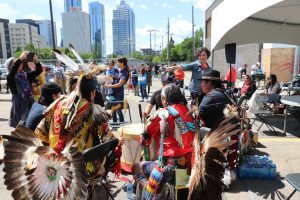
What this Day Means at Bissell Centre
A tenant of the National Truth and Reconciliation event at Bissell Centre is honouring those who survived residential schools. There will be a list of survivors in attendance during the event, to recognize their resilience in the face of an atrocity that took so many.
It might look like we’re celebrating at our National Day for Truth and Reconciliation event, but we’re mourning and grieving,” says Lee-McDonald. “We’re acknowledging the survivors of residential schools and honouring them. This is our day to mourn in a healthy way from our past traumas.”
While everyone at the National Truth and Reconciliation Day event at Bissell Centre will be commemorating that they’re still here, there is still a lot of healing to be done. National Day for Truth and Reconciliation may be about grief and healing, but it’s also about empowerment and reclamation.
“This is a day given to us by the Creator,” says Lee-McDonald. “It was given to help us grieve and heal and be healthy. We want to take this day for our ceremony and live our truths in our cultural identity. It’s a big deal we can hold this ceremony on the streets of Edmonton.”
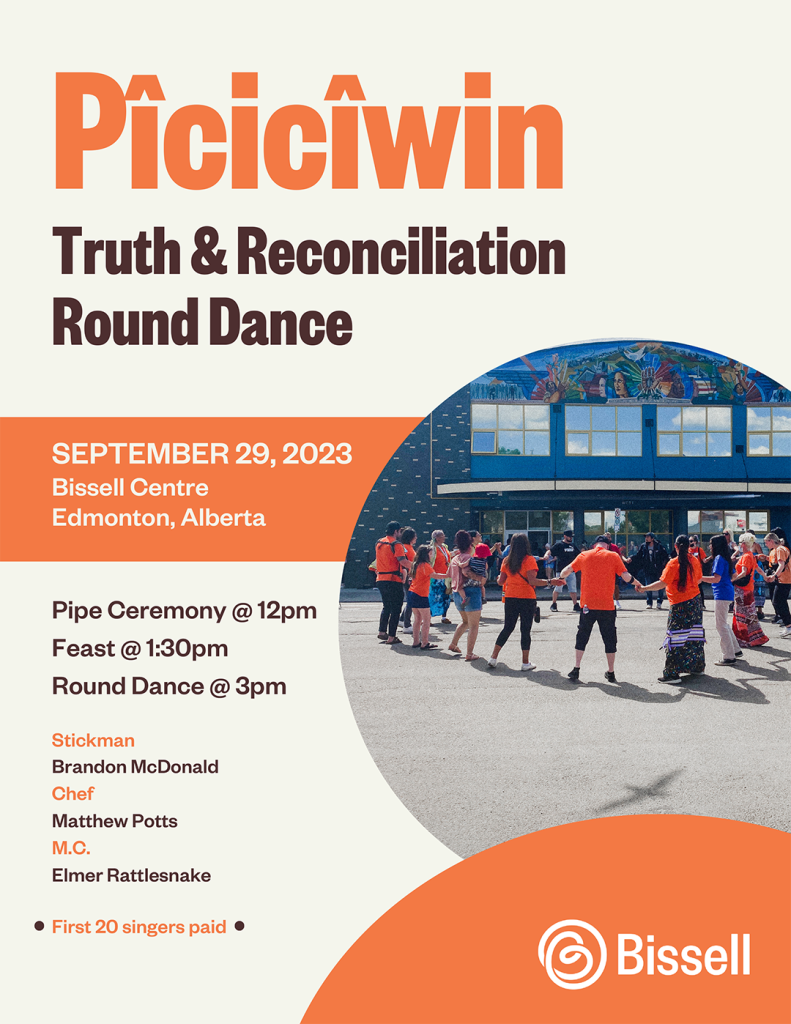
Ten years ago, RJ Formanek wanted to start a conversation about Fetal Alcohol Spectrum Disorder (FASD). As an adult who has FASD, he thought educating people and showcasing his diverse skillset and reliance was important. And the Red Shoe Walk was born.
RJ figured he should stand out – red shoes did the trick. With his crimson kicks, RJ took to the street, stopping to talk with anyone willing to learn about FASD. And no wonder he wanted to start a conversation about FASD – especially when it feels like no one is talking about FASD.
This year, our Red Shoe Day Event sees us walking from Hope Terrace, our supportive living apartment for folks with FASD, through the King Edward Park community, and all through Bonnie Doon and into Strathcona and then returning to have lunch and an art sale at the Shamrock Curling Club. The art sale will feature artists who have FASD. Register today to join us on September 9 from 10:30 a.m. to 2:00 p.m. for a Red Shoe Walk through the community and bring awareness to a disorder that needs to be talked about more.
4% of Canada’s population has FASD
There are more people in Canada who have FASD than autism, cerebral palsy, and Down syndrome combined. And no two people who have FASD are alike. Many people who have FASD have rewarding careers and fulfilling lives – they uncover their strengths and lean on them to find success.
FASD affects people differently depending on when alcohol was introduced to their fetal development. Alcohol slows down development, both physically and mentally. This means how FASD affects a person is highly individualized, often requiring individualized programs and supports to help them live with dignity.
FASD is a hidden disability as most people who have FASD have no physical signs of impairments. Adolescents and adults who have FASD can experience high rates of difficulties in daily living and adverse outcomes, including school disruption, mental health issues, and challenges with independence. This is why the Red Shoe Walk is so important.
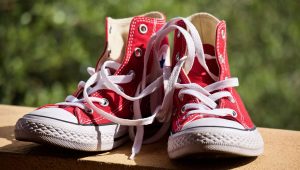
There is shame in an FASD diagnosis
Often, people miss or never receive an FASD diagnosis because of the shame involved – not on the people who have FASD, but on those who carried them in utero. There are ad campaigns and information packages all over highlighting the risks of drinking alcohol while pregnant.
A person may consume alcohol while pregnant without ever knowing they’re affecting the fetus they carry. They may not know they’re pregnant, have been told a little alcohol doesn’t hurt, come from a community where that information isn’t available, are experiencing mental health or stress-related illnesses prompting them to drink, or for many other reasons that have nothing to do with other issues like poverty. With a better understanding of how a person can end up consuming alcohol while pregnant, we can better understand FASD.
FASD can affect anyone – not only people in poverty
A common misconception around FASD is it only affects people experiencing poverty – we know this is false. People who have FASD can come from a range of backgrounds and situations, sometimes even from affluent families. We’ve seen this firsthand at Bissell Centre with participants in different programs telling us their stories and experiences.
Where the issue around poverty gets cloudy is how people who have FASD can be more likely to experience houselessness. That difference in understanding and mental processing can make navigating systems that we take for granted more difficult. We designed our programs specifically with this in mind – ensuring that services for folks who have FASD are readily available no matter the individuals’ personal circumstances.
Helping people live with dignity
Our Fetal Alcohol Spectrum of Services (FASS) program works to understand individuals who have FASD as whole people. We work one-on-one with our program participants to identify their unique strengths to guide them toward personal fulfillment.
Part of our FASS program is Hope Terrace. This is a supportive housing building specifically designed for people who have FASD. Wraparound services for FASD are included in this building, which also features a Snoezelen room to help individuals with emotional regulation.
Recently, a group from our FASS program contributed to the book Born Broken, detailing what our participants found most important to them in their own voices. This book highlights what folks who have FASD have to offer the world, their fears and struggles, and how they’re moving forward.
Maybe no one is talking about FASD simply because they don’t understand it. On September 9, keep an eye out for some folks walking all in Red Shoes. Ask questions about FASD and the Red Shoe Walk to ensure we are all talking about FASD.
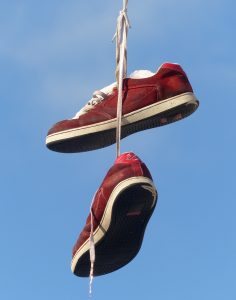
Bissell’s National Indigenous Peoples Day celebration weeks ago brought 96 St. right outside Bissell to life. Bissell Centre has been celebrating National Indigenous Peoples Day, proclaimed in 1996 by the Canadian Government, for well over a decade! This year, it was so much more than a block party– our team made sure this was a celebration to remember.
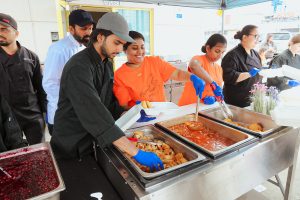
Keeping Traditions Alive
Our Food Services kitchen team made traditional stew and Bannock for everyone who attended. In total, they served more than 900 meals! Elders from the community held a traditional pipe ceremony to kick things off. They shared stories of struggle and expressed why the customs and traditions they grew up with are so important to folks from Indigenous communities.
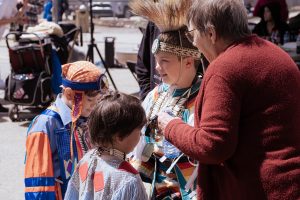
Energetic Local Performances
Families enjoyed the traditional hand games from Indigenous communities. Plus, dance and music performances from the Thunder Lake Singers & Dancers and flutist Theo Waskahat. The block was alive with music, drumming, and dancing for the whole community to enjoy.
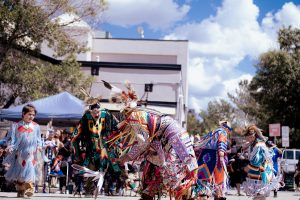
Sharing and Learning Together
National Indigenous Peoples Day is always an amazing celebration, but this year’s was truly one to remember. We’re so happy and grateful for everyone who came out, participated, shared their gifts, and helped make sure Indigenous customs and traditions will stay alive for the people who need them most.
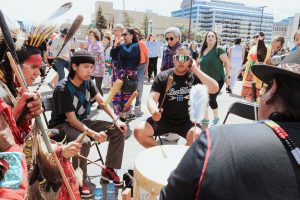
National Indigenous Peoples Day 2023 Photo Highlights
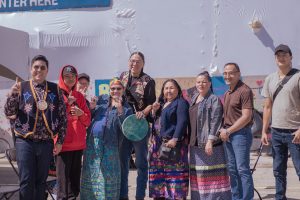
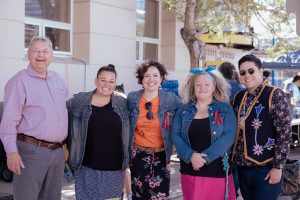
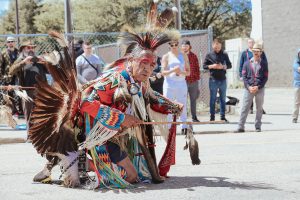
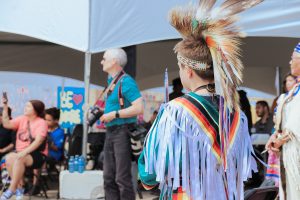
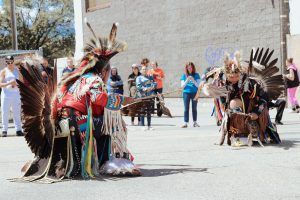
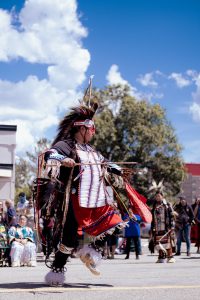
Originally published on January 20, 2023
Updated January 15, 2024
Spending a night outside in Edmonton’s harsh winters can take its toll on people. In 2021, it’s estimated that 222 people experiencing houselessness in Edmonton died – many from avoidable deaths such as from exposure. That is a 70 per cent increase from the year before. Between 2021 and 2022, there were 786 reported cases of extreme frostbite, with 91 leading to amputations.
For countless Edmontonians, there is a very real prospect that they may experience houselessness. The Coldest Night of the Year fundraiser walk through downtown gives a small glimpse into what experiencing houselessness can be like.
This Year’s Walk for Bissell
Our goal in 2024 is to raise upwards of $200,000, after last year’s successful walk where we raised $190,000. Walkers are coming together on February 24, 2024, for either the two or five kilometre walk through downtown Edmonton – with teams raising funds since December and continuing to raise funds until one month after the walk.
Not only is this a fun way to bring awareness to a serious issue in our city, but you can also see directly how those funds raised make a difference to the community. This is the sixth year that Bissell Centre is taking part in Coldest Night of the Year.
The funds raised for the downtown Coldest Night of the Year walk go directly back to Bissell Centre’s programs, ensuring that our city’s most vulnerable have the services they need to live with a better quality of life.
A History of Helping Those Experiencing Houselessness
Coldest Night of the Year was established in 2011 when three Ontario Ministries wanted to bring attention to what folks who are experiencing houselessness need to endure over Canada’s harsh winters. They started with a goal to raise $40,000 – by the end of the walk, they had raised well over $111,000.
This fundraiser was quickly adopted across Canada and the US, with 166 different locations hosting their own walks with funds going back to local community organizations. In 2022, more than $12 million was raised by more than 31,000 individual walkers in Canada and the US.
You can still contribute to this amazing fundraiser. Donate to a team (or start your own!), donate to someone walking, or support us directly at Bissell Centre by donating to the Walk with Bissell team. Check out our local event site and contribute today. With your help, we can reach our $200,000 goal and continue serving those most vulnerable in our city.
…Sadly, this is a decision people experiencing houselessness have to make every single day.
For 6these folks in Edmonton, gaining access to new, clean underwear is difficult. Some individuals may wear the same pair of underwear for months at a time, and some may go without underwear for just as long. Underwear is an issue we don’t often consider but can be a serious problem for those in the community.
Underwear is one of the most requested items by the people who use Bissell Centre services, but one of the least donated items.
“It doesn’t feel comfortable when you’re not wearing any underwear, and no one likes to put dirty underwear back on after a shower. Women have accidents; they need access to clean undergarments.” – Angie
So, let’s pass the question on to you. Would you rather wear dirty underwear, or go without?
Let’s weigh each of the options:
Wear Dirty Underwear
Wearing dirty underwear may not seem like a big deal at first, but as the weeks pass, bacteria and microbes will accumulate causing an embarrassing odour, irritating rash, and infection on your skin down there!
If you’re a woman and you have a leak or accident during that time of the month, you’ll have no choice but to continue wearing the dirtied underwear, which can contribute to even more bacteria and microbe growth.
Not to mention, after you shower and get all squeaky clean, you won’t have a fresh pair of undies to slip into and will have to pop on the smelly, old, bacteria-ridden pair.
Go Full Commando
Going without underwear sounds fun —“freeing” even —but what happens when the inevitable chafing and skin irritation come along with it? You’ll have to deal with that gnarly skin rash for weeks on end!
If you’re a woman and do not have access to female hygiene products, this decision could result in the use of unsanitary or improvised hygiene products, which could lead to an infection.
Without the barrier of underwear, there’s a higher risk for foreign bacteria to make contact with your skin. Among other issues, there’s also a greater chance of fungi development because your underwear isn’t there to absorb your sweat.
Wearing underwear is something that we often take for granted, but when faced with a decision like this, it is easy to see why clean underwear is so important to those who don’t always have access to it.
When a person experiences houselessness, underwear issues can contribute to a multitude of larger health problems and discomfort. For many people, especially folks experiencing poverty and houselessness, the availability of fresh, clean underwear makes all the difference.
This is why we created our #DropYourGonch campaign: so that no one in our community would have to make the decision between wearing dirty underwear, or going without.
The Drop Your Gonch campaign aims to fill gaps in the Bissell Centre community closet by reaching out to our supporters to help stock it full of new underwear for folks experiencing poverty.
The clean underwear donated by our supporters helps to provide our community with better personal health and hygiene, and a restored sense of dignity and self-worth.
Yes, everyone needs clean underwear, including folks experiencing houselessness.
New underwear is one of the most requested items by people who use our services, but one of the least donated. People are often denied their requests for undergarments because we simply have none to give.
Women are especially likely to be denied since women’s underwear is less frequently donated than men’s. When possible, they are offered the alternative of wearing men’s underwear, an experience that, apart from being physically uncomfortable, causes embarrassment and a reduced sense of self-worth. Our #DropYourGonch campaign aims to fill this desperate need by stocking our Community Closet full of clean, fresh underwear for participants to use.
We all know that it’s important to change our underwear every day, but some of the reasons why may surprise you. Here is a list of five reasons why clean underwear is critical for a person’s physical and emotional well-being and why everyone needs clean underwear to be happy and healthy.
1. Hygiene
Not changing your underwear regularly causes microbes and other bacteria to accumulate and fester, often causing an embarrassing odour and an itchy rash on the skin. To maintain hygiene and cleanliness, fresh underwear is a non-negotiable essential.
2. Health
Wearing the same underwear for an extended period of time can also have severe consequences for your personal health. The microbes and bacteria mentioned above can cause dangerous infections if they stay in contact with the skin for long periods of time, and the most serious of these can even lead to deadly conditions like kidney failure or bladder cancer. Clean underwear is more than a convenience; it is imperative to one’s health, and can even save lives!
3. Comfort
We offer free shower services in our Community Space, meaning participants who come in can get soap, shampoo, a razor, and other personal hygiene items, enjoy a hot shower, and leave feeling squeaky clean. And what’s the best part about taking a shower? Slipping into that nice, clean, fresh pair of undies when you’re done, of course! Our objective is to be able to provide every participant who uses our shower services with a clean pair of underwear. With your help, we can offer every participant that “just-showered-and-slipped-into-a-fresh-pair-of-undies” feeling, lending at least one small comfort to the people who need it most.
4. Self-confidence
The unpleasant odours and other adverse health effects caused by dirty undergarments can create something of a psychological barrier between the wearer and other people. Inevitably, the individual’s self-esteem and comfort in social interactions may suffer as a result. This impediment can be especially detrimental when it comes to significant interactions, like job interviews – situations that are already stressful enough without any added worries! A clean pair of undies allows the wearer the confidence they need to have successful relationships and social interactions.
5. Dignity
A clean pair of underwear can go a long way toward restoring an individual’s sense of dignity. The emotional toll of having to wear the same set of dirty undergarments for days, weeks, or months on end can be debilitating. A clean pair of underwear is more than a physical necessity – it can provide the recipient with a rejuvenated sense of dignity and self-worth. What gift could be more meaningful?
It’s easy to take for granted something as always having clean undergarments to wear every day. But everyone needs clean underwear and deserves it. For many people lacking basic life necessities, something so small really can make all the difference.
You can help!
Donate underwear during our annual
Drop Your Gonch drive!
Colourful regalia. Delicious food. Traditional performances. Laughter between friends. These were just a few of the sights and sounds to behold at Bissell Centre’s celebration of National Indigenous Peoples Day on Friday, June 21, a day which also marks the summer solstice. The solstice is notable for providing the longest stretch of daylight of the year, which was fitting, as the 10 am to 1 pm celebrations saw a reprieve from the relentless stretch of rainy days. As members of our community gathered in the street together to honour the rich and diverse culture and contributions of the Canadian First Nations, Inuit and Metis peoples, the clouds parted and the sun made a welcome appearance on a day that Indigenous people have devoted to celebrating and rejoicing in our connection to the sun and the Earth for thousands of years.
But National Indigenous Peoples Day is about more than just celebration. It’s an opportunity for all Canadians to reflect on the history of mistreatment and adversity that Indigenous people have faced in Canada for hundreds of years, ever since the endless miles of Canadian soil that had belonged solely to them from the beginning of time became inhabited by groups of people who did not share their beliefs or ways of life. The Canada we know today is a beautiful cultural tapestry, brightly woven with colourful threads from cultures, ethnicities and nationalities from all over the world, and we are known internationally as a country that will welcome those who need refuge or who seek a better life for their family with open arms. Even so, it’s important to acknowledge and reflect upon the fact that Canada became the nation it is today at great cost to Indigenous people and their storied heritage. And this history is far from ancient – the last Canadian residential school did not close its doors until 1996. For many Indigenous Canadians, the scars borne of decades of intergenerational trauma and the societal inequity that First Nations, Inuit and Metis people continue to face today often makes the healing process a long and difficult one.
While National Indigenous Peoples Day is an opportunity for both celebration and reflection, it also offers the promise of community. As the sun rose to its highest point in the sky over Bissell Centre on Friday, it shone down upon traditional performances of drumming, singing, and dancing, Indigenous art forms that continue to be passed down from generation to generation as visceral representations of the beauty, passion and deep spirituality of Indigenous culture. It alighted down upon friends, families and loved ones of all different cultures sitting down to a delicious traditional meal of stew and bannock, sharing stories and laughter as they ate together. It cast its dazzling light upon a day meant not only to celebrate the countless contributions that First Nations, Inuit and Metis peoples have made to Canada, but also for us as a wider community to show our solidarity with our Indigenous brothers and sisters and the adversity they continue to encounter every day.
Bissell Centre, founded in 1910, has always been an ally to the Indigenous community. In the days when Indigenous religious ceremonies and cultural practices were illegal in Canada, Bissell Centre provided a safe haven for Indigenous leaders to practice and keep their rich culture alive. We continue to strive today to be an organization where Indigenous traditions and practices are not merely accepted, but celebrated – not only on National Indigenous Peoples Day, but every day of the year.





















